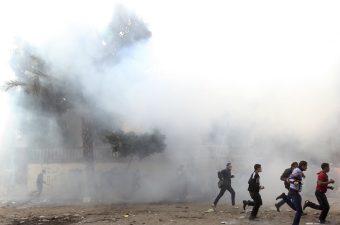 Do women in Cairo have bigger carbon footprints because they are afraid to ride their bikes?
Do women in Cairo have bigger carbon footprints because they are afraid to ride their bikes?
Transportation is a large contributor to air-pollution. Today, the whole world is shifting towards more sustainable means of transportation. While in most countries men and women are equally active in such a movement, in more traditional societies, women are denied the right to a safe street where they can walk or use their bicycles instead of driving cars, and thus have a larger carbon footprint. Egypt is one of those countries and I am one of the women.
In the early days of the cycling movement in Cairo, a friend and me, both working in the filed of sustainable development, got all analytical about it and decided to explore the reasons that got people cycling and the reasons that discouraged them from cycling.
From our surveys we found that, in part, some women could not use bicycle in their daily commutes due to widespread harassment on Cairo streets.
Most found themselves confined to the weekly Friday rides when streets were emptier, resorting cycling merely as an urban sport. Even on Fridays they could not ride alone, and had to tag along with a group of friends, preferably male.
To the surprise of many, on Fridays 60 percent of the cyclists are girls from all walks of life, adorning sportswear, urban wear, veils, helmets and t-shirts saying diverse messages. Also, a few brave women have ventured on weekdays on their own to cycle to their workplace in spite of harassment.
While regular street harassment is offensive and psychologically disturbing, harassing cyclists could kill. The cyclists could lose balance if frightened or grabbed, and sometimes causing this unbalance is even the harasser’s intention. Many members of the cycling clubs have experienced harassment and some have refrained from using their bicycles the following week.
Reclaiming women’s right to safe streets
To provide its women members with a safer riding experience, the Cairo Cycler’s Club (CCC) has partnered with two anti-harassment initiatives. The first, Harassmap has put in place a system for reporting incidences of sexual harassment via SMS messaging. By mapping these reports online, the initiative will act as an advocacy, prevention, and response tool, highlighting the severity and pervasiveness of the problem.
[youtube]http://www.youtube.com/watch?v=zTUGSorTZGc[/youtube]
The second, 678, the movie (screener in Arabic above), is a docudrama shedding light on the issue of sexual harassment and its root causes. CCC is planning an awareness raising event with Harassmap & 678 in the near future, to advocate for safe streets.
We hope that this partnership will be fruitful.
Read more on greening Cairo:
Keep It Clean Cairo
Tap Into Solar Energy at MENASOL
Get A Ride With Egypt Car Poolers
Inji El Abd is the co-founder of the Green Arm (a platform and incubator for environmental initiatives in Egypt) and the Cycling for Change movement (whose mission is to make Cairo a bicycle friendly city).




I’m so pleased that you covered this program.